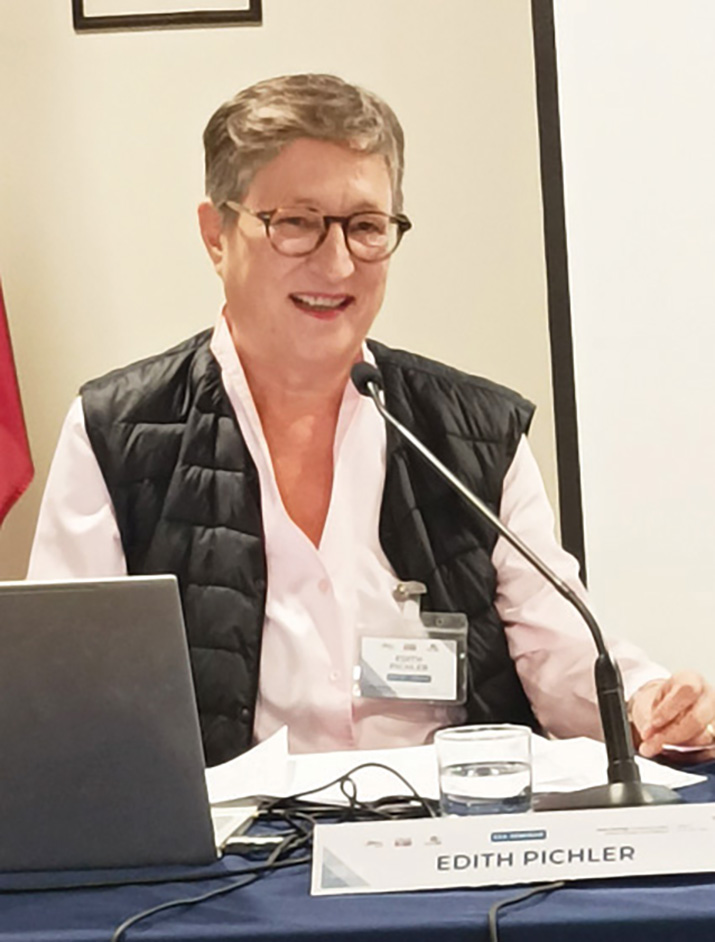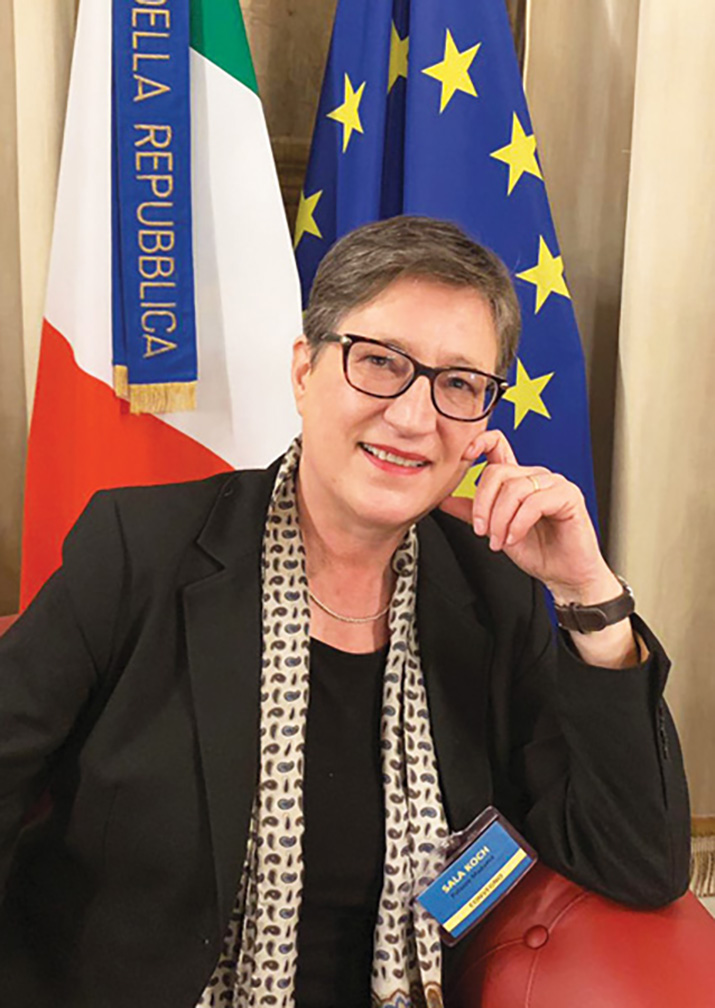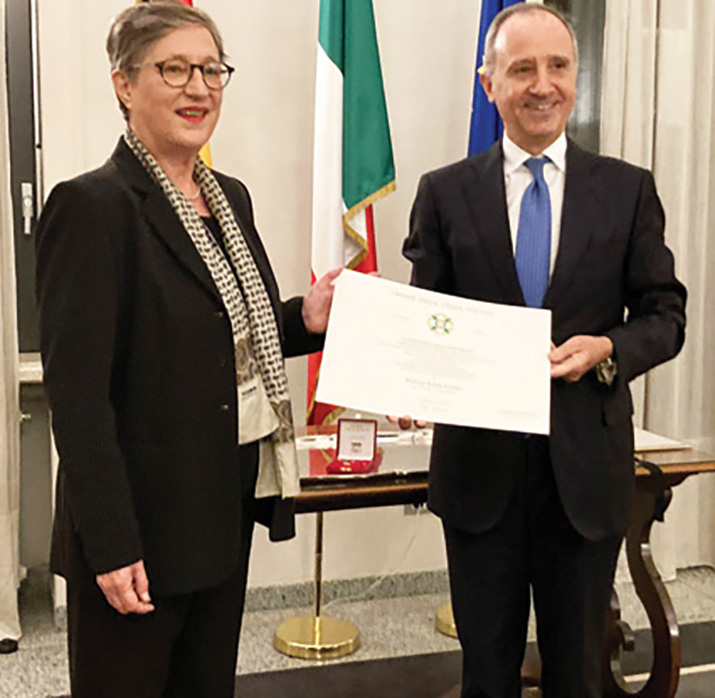A STORY OF TRENTINI IN THE WORLD
EDITH PICHLER FROM VAL DI NON TO GERMANY
We asked some descendants of Trentino emigrants to tell their stories in the first person, emphasising how their origin has directed and influenced them in life. This would not have been possible without the active and friendly cooperation of the Trentini nel Mondo Association, founded in 1957 with the aim of social solidarity and as a tool of aggregation and assistance for Trentino migrants and their descendants. The person we present in this issue is Edith Pichler, originally from Cles, who currently lectures at the Institute of Economics and Social Sciences at the University of Potsdam.
Berlin has always been a city for young people (not just in terms of age) and has consistently attracted individuals who came because of its unique cultural and social situation. The West Berlin of those years, the ones before the fall of the famous 'wall', was an open, libertarian, seductive city. Thanks to its vibrant social and cultural scene, also supported by federal government funds, it offered spaces for everyone: artists, creatives, and wanderers alike.
The metropolis on the Spree attracted not only rock stars like David Bowie and Lou Reed, directors like Peter Stein and actors like Bruno Ganz, but also young Italians, drawn by the strength of the student movement. It was not an easy city to get to back then. Not only did you have to cross two iconic Cold War borders (BRD-GDR; GDR-West-Berlin) by car or train via the transit corridors from West Germany through the Deutsche Demokratische Republik to West Berlin, but there were no international flights either: the only airlines that flew to West Berlin, again through corridors, were Pan Am, British Airways and Air France.
In the 1980s there was a Rome-Munich rail connection which, if I remember correctly, was called the Alpen-Express. The train had Kurswagen, carriages that ran on the Rome-Berlin and Rome-Puttgarden-Stockholm routes. Sometimes, standing at the Trento station, I would read about the destinations of these carriages, distant, unknown, fascinating worlds. Puttgarden in particular gave me the sense of something very far north.
And it was in one of these carriages that were added to the Deutsche Reichsbahn trains of the GDR in Munich, the so-called Transitzüge, I arrived in Berlin as an au pair. Early in the morning on the outskirts of West-Berlin, the first thing that amazed me were the tiny houses/shacks in the middle of fields, which reminded me of the shantytown in the film Miracle in Milan, although they were more 'neat and tidy'. I thought this isn’t possible in Germany... and then in the GDR, which claims to be 'the home of the workers', then luckily a fellow traveller from Italy-Berlin clarified for me that they were the Schrebergarten huts, those of the communal allotments, which also played a significant recreational role during the period of the wall because of the city's status as an encircled island.
One detail about Berlin that struck me immediately - it was late autumn and the heaters were already on- was a 'smell' in the air: I later discovered it came from the power stations and boilers that used coal. For years I associated Berlin with this smell, which was, a symbol, the identity and the memory of the city for many Italians at the time. But to me it also somehow reminded me of spring in Val di Non - I am in fact originally from Cles - it was the smell in the air when the farmers were burning the brushwood in the fields and this similarity helped me feel less 'out of place'.
After arriving in Berlin, I studied at the Otto-Suhr Institut of the Freie Universität, obtaining my Ph.D. (Dr. Phil.) in Political Science and the national scientific qualification as associate professor for Sociology of Economic and Labour Processes. Since 2011, I have been a lecturer at the Institute of Economics and Social Sciences at the University of Potsdam (Centre for Citizenship, Social Pluralism and Religious Diversity). Previously, I taught at the Humboldt-Universität in Berlin and was a Visiting Professor at La Sapienza University in Rome. My fields of expertise are emigration, ethnicity, minorities, and I have published numerous essays on the Italian presence in Germany. I am a member of the Rat für Migration, as an expert of the Neodemos Association for Demographic Studies and Social Policy and of Politika - Society for Political Science of South Tyrol (member of the Italian Society for Political Science and the Austrian Society for Political Science). I am a member of the Scientific Committee for the Migrantes Foundation Italians in the World Report and for the volumes to be published by Donzelli on the History of Italian Emigration in Europe. I collaborate with the Centro Altreitalie in Turin and the Cser (Centre for Emigration Studies in Rome). Since 2023 I have been vice-president of the Fai (Italian Academic Forum) in Germany.
Thanks to these activities, on 30 October I was awarded the Order of the Star of Italy, in the rank of Officer, by the President of the Republic, Sergio Mattarella. This is an honour reserved for those who have distinguished themselves in promoting ties with Italy, as the Italian ambassador to Germany, Armando Varricchio, recalled during the award ceremony. 'Edith Pichler,' said the ambassador, 'has been a point of reference in studies on the Italian community in Germany for years. Always managing to combine a scientific and open approach in the analysis of various issues important to the Italian community in Germany, her contribution has helped to better understand the Italians living in this country’.
Meanwhile, during a holiday on the Baltic Sea, I 'discovered' Puttgarden, a small town on the island of Ferhman with a railway terminal for ferry departures to Denmark. Not quite what I had in my mind. It was not a disappointment but rather a downsizing of what I had imagined. And over time, my Berlin dimension has also 'shrunk'... because now one tends to stay and move more and more in one's own Kiez, even after the restrictions imposed for the Covid. The transformations that the city is undergoing - especially in the central districts - make it more and more like other cities and less fascinating, and many places, many squares, many locations now appear to belong more to 'others', which is why one perhaps dwells more on what is still 'yours', that is, part of your own Berlin identity, or what you think it is.

Edith Pichler

Edith Pichler before the award ceremony

Edith Pichler awarded the Order of the Star of Italy by the Italian Ambassador to Germany, Armando Varricchio






